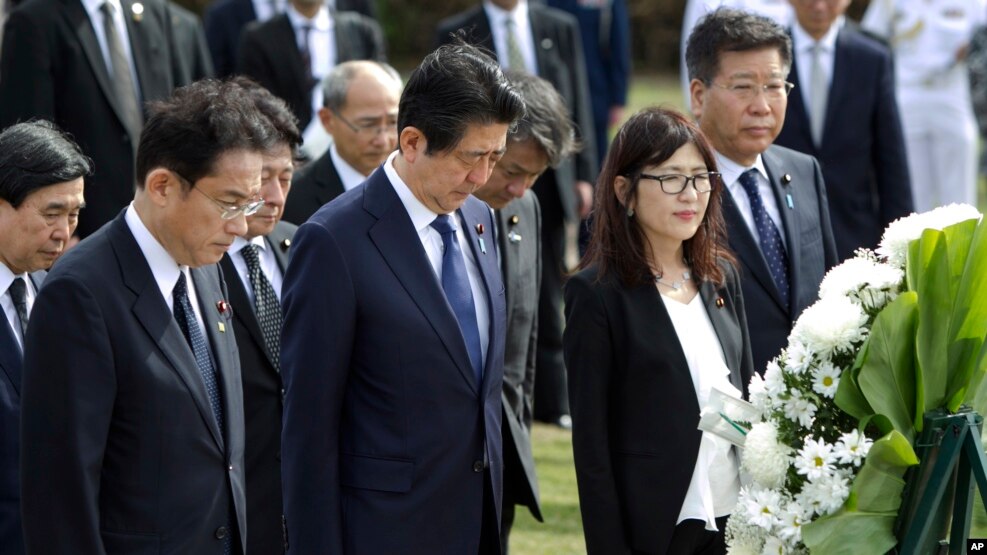Asia
Japanese Prime Minister Shinzo Abe laid wreaths at several memorials Monday ahead of his Tuesday meeting with U.S. President Barack Obama at the Pearl Harbor memorial honoring the 2,400 people killed by a Japanese attack in 1941.
Abe will be the first Japanese prime minister to visit the memorial, but his staff has made it clear the purpose of the trip is not to apologize for the attack that launched the U.S. into World War II. Instead, Abe wants to show how U.S.-Japan relations have evolved since the war.
"We must never repeat the devastation of war," he told reporters before leaving Japan. "Together with President Obama, I want to tell the world of this pledge for the future and of the value of reconciliation."
Abe laid a wreath and stood in silence at the National Memorial Cemetery of the Pacific, which holds the remains of military members, including many who served in World War II.
Among those buried there is former Hawaii Senator Daniel Inouye, who fought in the war and whose parents were Japanese immigrants. Abe laid a separate wreath at Inouye's gravesite.
The prime minister also visited and laid a wreath at the nearby Ehime Maru Memorial for nine people who died in 2001 when a U.S. Navy submarine collided with their Japanese fishing vessel.
The last Japanese prime minister to visit Pearl Harbor was Shigeru Yoshida, who made a brief stop there in 1951. That was before the USS Arizona Memorial was built to honor those who died on that site during the Japanese attack.
In May, President Obama became the first sitting U.S. leader to visit the city of Hiroshima, where in 1945 American forces dropped the world's first atomic bomb, killing an estimated 140,000 people. Obama gave a speech that also was not an apology, instead honoring the dead and noting the legacy of what he called the "terrible force unleashed in the not so distant past."
"We have a shared responsibility to look directly into the eye of history and ask what we must do differently to curb such suffering again," Obama said.
The president added, "And perhaps, above all, we must reimagine our connection to one another as members of one human race."
Japanese Prime Minister Shinzo Abe laid wreaths at several memorials Monday ahead of his Tuesday meeting with U.S. President Barack Obama at the Pearl Harbor memorial honoring the 2,400 people killed by a Japanese attack in 1941.
Abe will be the first Japanese prime minister to visit the memorial, but his staff has made it clear the purpose of the trip is not to apologize for the attack that launched the U.S. into World War II. Instead, Abe wants to show how U.S.-Japan relations have evolved since the war.
"We must never repeat the devastation of war," he told reporters before leaving Japan. "Together with President Obama, I want to tell the world of this pledge for the future and of the value of reconciliation."
Abe laid a wreath and stood in silence at the National Memorial Cemetery of the Pacific, which holds the remains of military members, including many who served in World War II.
Among those buried there is former Hawaii Senator Daniel Inouye, who fought in the war and whose parents were Japanese immigrants. Abe laid a separate wreath at Inouye's gravesite.
The prime minister also visited and laid a wreath at the nearby Ehime Maru Memorial for nine people who died in 2001 when a U.S. Navy submarine collided with their Japanese fishing vessel.
The last Japanese prime minister to visit Pearl Harbor was Shigeru Yoshida, who made a brief stop there in 1951. That was before the USS Arizona Memorial was built to honor those who died on that site during the Japanese attack.
In May, President Obama became the first sitting U.S. leader to visit the city of Hiroshima, where in 1945 American forces dropped the world's first atomic bomb, killing an estimated 140,000 people. Obama gave a speech that also was not an apology, instead honoring the dead and noting the legacy of what he called the "terrible force unleashed in the not so distant past."
"We have a shared responsibility to look directly into the eye of history and ask what we must do differently to curb such suffering again," Obama said.
The president added, "And perhaps, above all, we must reimagine our connection to one another as members of one human race."


Post a Comment